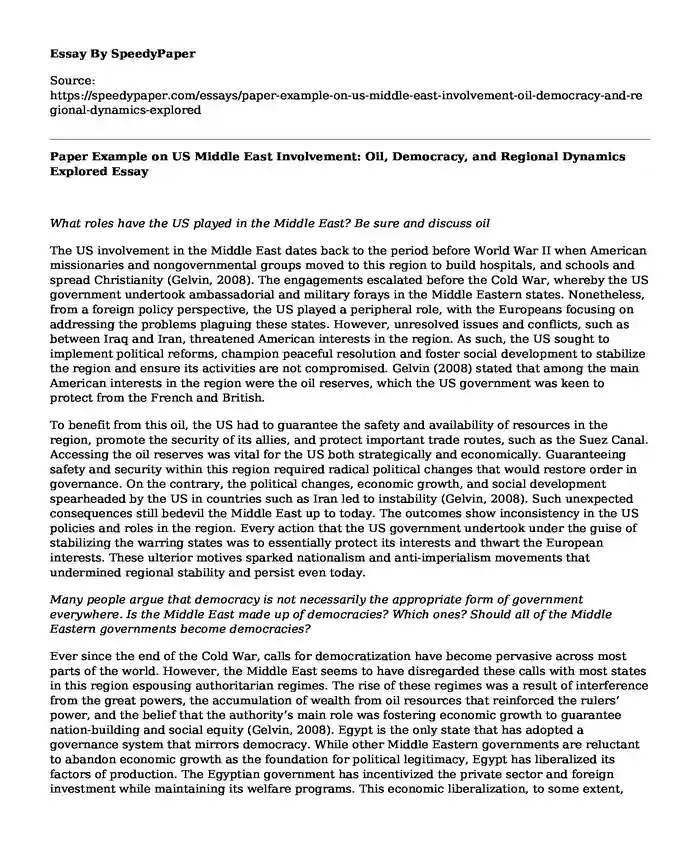
| Type of paper: | Essay |
| Categories: | War Ethics Society Essays by wordcount Historical & political figures |
| Pages: | 3 |
| Wordcount: | 664 words |
What roles have the US played in the Middle East? Be sure and discuss oil
The US involvement in the Middle East dates back to the period before World War II when American missionaries and nongovernmental groups moved to this region to build hospitals, and schools and spread Christianity (Gelvin, 2008). The engagements escalated before the Cold War, whereby the US government undertook ambassadorial and military forays in the Middle Eastern states. Nonetheless, from a foreign policy perspective, the US played a peripheral role, with the Europeans focusing on addressing the problems plaguing these states. However, unresolved issues and conflicts, such as between Iraq and Iran, threatened American interests in the region. As such, the US sought to implement political reforms, champion peaceful resolution and foster social development to stabilize the region and ensure its activities are not compromised. Gelvin (2008) stated that among the main American interests in the region were the oil reserves, which the US government was keen to protect from the French and British.
To benefit from this oil, the US had to guarantee the safety and availability of resources in the region, promote the security of its allies, and protect important trade routes, such as the Suez Canal. Accessing the oil reserves was vital for the US both strategically and economically. Guaranteeing safety and security within this region required radical political changes that would restore order in governance. On the contrary, the political changes, economic growth, and social development spearheaded by the US in countries such as Iran led to instability (Gelvin, 2008). Such unexpected consequences still bedevil the Middle East up to today. The outcomes show inconsistency in the US policies and roles in the region. Every action that the US government undertook under the guise of stabilizing the warring states was to essentially protect its interests and thwart the European interests. These ulterior motives sparked nationalism and anti-imperialism movements that undermined regional stability and persist even today.
Many people argue that democracy is not necessarily the appropriate form of government everywhere. Is the Middle East made up of democracies? Which ones? Should all of the Middle Eastern governments become democracies?
Ever since the end of the Cold War, calls for democratization have become pervasive across most parts of the world. However, the Middle East seems to have disregarded these calls with most states in this region espousing authoritarian regimes. The rise of these regimes was a result of interference from the great powers, the accumulation of wealth from oil resources that reinforced the rulers’ power, and the belief that the authority’s main role was fostering economic growth to guarantee nation-building and social equity (Gelvin, 2008). Egypt is the only state that has adopted a governance system that mirrors democracy. While other Middle Eastern governments are reluctant to abandon economic growth as the foundation for political legitimacy, Egypt has liberalized its factors of production. The Egyptian government has incentivized the private sector and foreign investment while maintaining its welfare programs. This economic liberalization, to some extent, results in political liberalization, which forms the basis for Egypt’s pluralist democracy.
The Middle East nations should all consider becoming democracies. The model of using economic development as the governance framework cannot guarantee social justice. Furthermore, focusing on economic development rather than building a strong social and political fabric undermines the regime’s legitimacy. The most effective way of creating a just and equitable nation is by allowing people to exercise their liberties and be free to make choices that benefit them socially, politically, and economically. Democracy will ensure that the Middle Eastern governments allow liberal minds and ideas to propel the countries’ social, political, and economic agendas. Besides, the failure of the economic development model to promote social justice shows further that these governments should adopt democracy, which will enable the decentralization of power and planning to grant the people more free will.
References
Gelvin, J. L. (2008). The modern Middle East: A History. Oxford University Press, USA.
Cite this page
Paper Example on US Middle East Involvement: Oil, Democracy, and Regional Dynamics Explored. (2023, Nov 05). Retrieved from https://speedypaper.com/essays/paper-example-on-us-middle-east-involvement-oil-democracy-and-regional-dynamics-explored
Request Removal
If you are the original author of this essay and no longer wish to have it published on the SpeedyPaper website, please click below to request its removal:
- Essay Sample: Male Machismo in the Film La Mission
- Essay Sample: Bringing Change to a Bank
- Article Review Essay: Stereotypes and Self-Perceptions of Physical Education Pre-Service Teachers
- Free Essay on Financial Reporting and Analysis
- Essay Example: Self Interest vs. The Merits in Politics
- Mandatory Minimum Sentencing Law
- Free Essay: Music Role in the Film "Pirates of the Caribbean"
Popular categories




